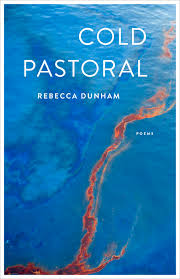News and a mini-review, Cold Pastoral by Rebecca Dunham.
First, the news – I’m delighted to have been placed fourth in the Kent and Sussex Poetry Society Open Poetry Competition. I picked up the flyer in the library in Glasgow and brought it all the way home, where I stuck it on my blackboard. First competition entered this year and I’m totally chuffed!
My French class has moved this year – we’re now up in Lonsdale street and my walk from there to the SLV takes me past Embiggen books. A dangerous thing. Last Wednesday I was forced to buy Cold Pastoral by Rebecca Dunham. I am so glad I did. This is important poetry. Below is my mini-review of Cold Pastoral, Rebecca Dunham, Milkweed Editions, 2017.

Called variously docu-poetry of witness or ecopoetry, Rebecca Dunham’s fourth collection, Cold Pastoral, is a powerful, unflinching scrutiny of our failure to be careful custodians of our planet. While many poems document the Deepwater oil-spill disaster, no one can exempt themselves from the stringent questions raised by these poems.
Pastoral poetry is usually bucolic – gentle rhapsodies of agrarian romanticism. These poems examine landscapes devastated by greed – and the human lives destroyed or damaged in the scramble for wealth, consumables and convenience. This is the pastoral poetry for the twenty-first century – chilling and filled with foreboding.
The poems offer no answers. But perhaps the question of what we will take with us in our inexorable and careless misuse of all our resources is too huge to contemplate. It’s vast echoing reproach renders the individual impotent, reduced to a child’s stubborn excuse, ‘It’s wasn’t me!’.
The Deepwater poems which form the spine of this collection do hold people accountable – but also insist that it is our responsibility to check the greed of corporations, multinationals and governments. The poems which give voice to the mourners and to the men killed in this environmental – and preventable – tragedy, deftly crack the laconic lyricism of ordinary speech:
Look down in the moon pool only fire’s
solid sheet look up nothing here
But flames way past the crown deck gassed
Slick one and a half inches deep –head
For the lifeboats abandon ship–mud
Thick as mucus “don’t slip” starboard
‘Blowout’ (p.30)
….Love can turn a man
to flame. Not that he said
Anything. I’m not crazy,
But when the sun split
him wide, he left me this, look,
my body veined in soot.
‘Elegy for the Eleven’ (p.33)
But Dunham rejects a single texture for her disciplined lament. She assembles official documents, interviews, ekphrastic meditations, classical references and journal notes, marshalling her weapons against silent complicity:
My car idles on the road’s shoulder, Outside the Louisiana air steams. I let the open window wash out the car’s false chill. Looking around, I pull my notebook from the glove box and press pen to paper.
If I held a mirror to this place, could its breath still blossom on the glass?
‘A Hive of Boxes’ (p. 57)
These are challenging poems that ask necessary questions and record terrible facts without compromising a strong poetic aesthetic. How can we bear to read about our own acts of annihilation? Can we afford not to?
I am the poet of the eye
filled with dirt. Mouth
shut. But tell me
who among you could conjure
the gift, at such depths,
of seeing in the dark?
‘Elegy, Sung in Dirt’ (p.19)
